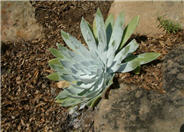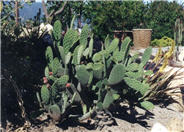
Common name:Purple Tree Aeonium
Botanical name:Aeonium arboreum 'Zwartkop'
Aeonium arboreum 'Zwartkop' is a succulent perennial that is used for accenting effect. Aeonium arboreum grows 3' tall and wide. Each branch has a 6"-8 " wide rosette of dark green, fleshy leaves.The flowers are yellow in clusters.

Common name:Tree Aloe
Botanical name:Aloe arborescens
This shrub is large, full of branches and produces deep orange blooms. The flowers produce a nectar that is attractive to many different birds; this plant is grown all over the world.

Common name:Chalk Dudleya, Chalk-Lettuce
Botanical name:Dudleya pulverulenta
Chalk Dudleya is a succulent. with 12" diameter rosette and waxy leaves; it has interesting flower spikes.

Common name:Indian Fig Prickly Pear
Botanical name:Opuntia ficus-indica
This Opuntia is more tree-like than other types; it grows to15' tall. It usually has no spines but some glochids can be found. Flowers are yellow to orange in late spring and early summer. Fruit is edible. It does best in full sun and is frost sensitive. It needs well drained soil. The major pest and source of the red dye cochineal comes from a scale.

Common name:Australian Grass Tree
Botanical name:Xanthorrhoea quadrangulata
This grassy perennial will eventually grow to 15' high. It is a tree-like plant. Foliage is fiber optic looking with linear green leaves that are 2'-4' long and shimmer in the wind. The long flowering stalk resembles a jousting lance and is a stunning accent plant. Tall grasses are highly combustible.

Common name:Rocky Point Ice Plant
Botanical name:Malephora lutea
Succulent, bright green leaves provide a lush backdrop for yellow daisy flowers. It blooms off and on nearly all year with short breaks in winter and summer. It grows to about 10" tall and 3'-4' wide. It can burn back in very hot summer but regrows quickly.
| Designer: | Savor the Southwest Look |
Photographer: GardenSoft |
Soils and Compost:
Physical weed control, including mulching, or hand removal protects the watershed from harmful chemicals.
Water Saving Tip:
Irrigate in the early morning to minimize evaporation.
Integrated Pest Management:
Drip and other smart irrigation delivers water directly to roots, allowing no excess water for weeds.

